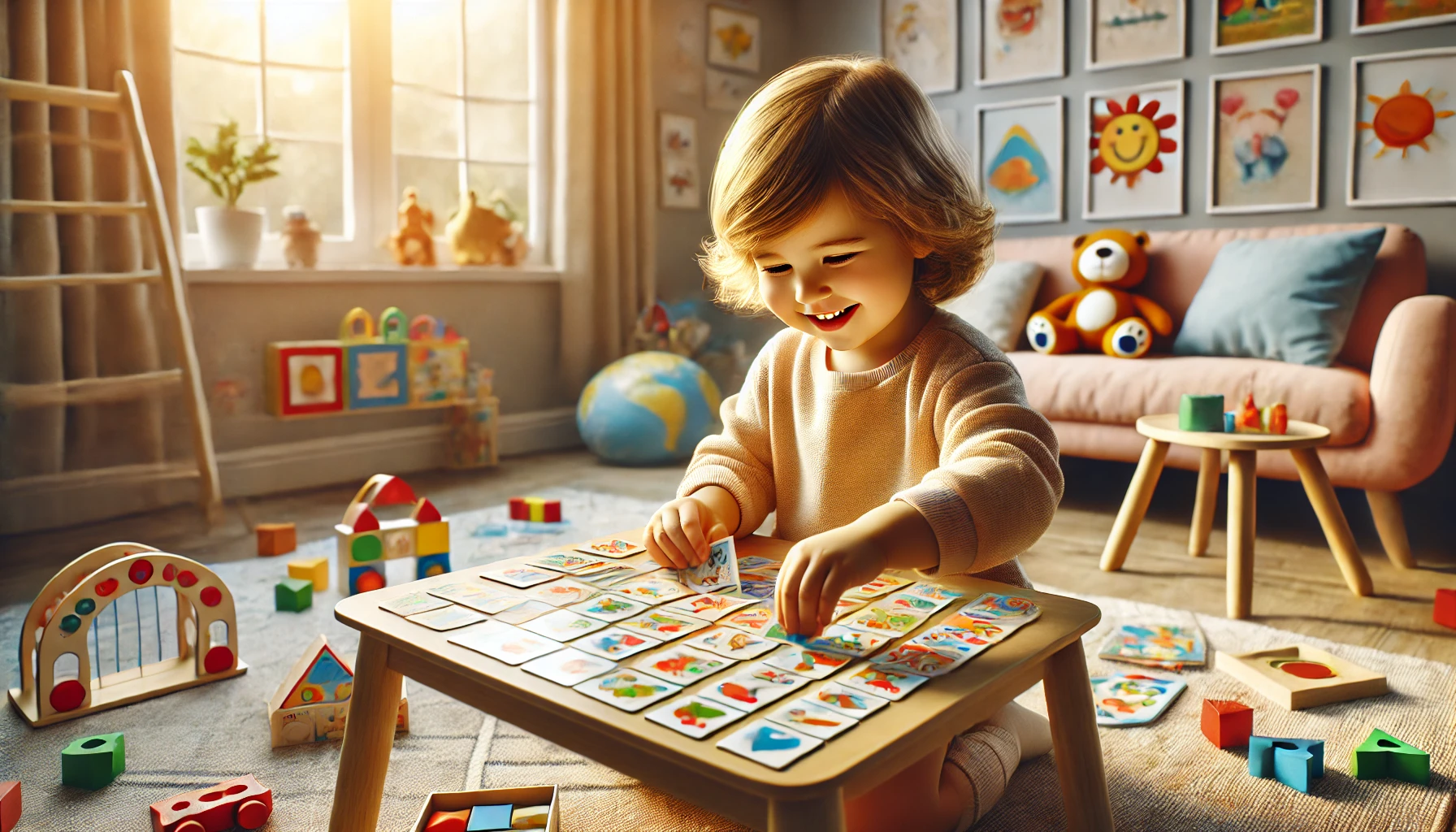Cognitive development is all about how children think, explore, and figure things out. It’s the foundation for skills like memory, attention, problem-solving, and logical thinking — and it begins developing from the very first years of life.
One of the best ways to nurture this development in young children is through educational games. These activities can boost mental growth while being playful, engaging, and even part of your daily routine.
In this article, you’ll discover powerful and simple games that help strengthen cognitive skills — right from home.
What Is Cognitive Development in Early Childhood?
Cognitive development includes a variety of mental processes that allow children to:
- Learn and understand new concepts
- Focus and pay attention
- Remember instructions and information
- Make decisions and solve problems
- Explore cause and effect
Through age-appropriate games, you can help your child build these abilities naturally while having fun.
1. Matching Games
What it develops: Memory, attention to detail, visual recognition
Use cards with images, colors, numbers, or shapes. Start with a few pairs and gradually increase the difficulty as your child progresses.
You can also use objects from around the house, like socks, lids, or bottle caps — as long as they come in matching pairs.
💡 Tip: Make your own DIY matching cards using pictures from magazines or drawings.
2. Puzzle Play
What it develops: Spatial reasoning, problem-solving, patience
Puzzles are classics for a reason. They encourage kids to figure out how pieces fit together, improving their logical thinking and perseverance.
Choose puzzles that are age-appropriate:
- 2–3 pieces for toddlers
- 4–12 pieces for preschoolers
- 20+ pieces as they grow
Floor puzzles or wooden puzzles with knobs are also great for younger children.
3. Memory Tray Game
What it develops: Short-term memory, observation skills
Place a few items (5–8) on a tray. Let your child study them for a minute, then cover the tray and secretly remove one. Ask:
- “What’s missing?”
You can switch roles, too, and let your child be the one who hides an item.
It’s a quick and fun way to improve memory and attention to detail.
4. Sorting and Categorizing
What it develops: Logical thinking, classification, early math skills
Give your child a variety of objects and ask them to sort by:
- Color
- Size
- Type (animals, food, shapes)
You can use real items like buttons, toys, blocks, or even snacks like fruit loops or crackers.
Ask questions like:
- “Why did you put these together?”
- “Can we sort them in a different way?”
This encourages critical thinking and flexibility.
5. Cause and Effect Play
What it develops: Predictive thinking, experimentation
Toys like pop-up boxes, ramps with balls, or even simple water play teach kids that actions lead to reactions.
Some fun ideas:
- Drop different objects into water: What floats? What sinks?
- Stack blocks: What happens when you remove one from the bottom?
- Push a toy car down different slopes
Let children make predictions and observe what happens — a great early step into scientific thinking.
6. Obstacle Courses
What it develops: Planning, sequencing, motor coordination
Create a simple obstacle course at home using pillows, chairs, and tunnels (or blankets). Ask your child to follow instructions:
- “First crawl under the chair, then jump over the pillow, then touch the wall.”
You can make it a game where they remember a sequence of actions — perfect for cognitive flexibility and memory.
7. “What Comes Next?” Pattern Games
What it develops: Pattern recognition, logic
Create simple patterns with colors, toys, or objects. Example:
- Red, blue, red, blue… (What comes next?)
- Spoon, fork, spoon, fork…
This kind of thinking supports early math and reasoning skills. Let your child create their own patterns too.
8. Listening Games
What it develops: Auditory processing, concentration
Play games like:
- “Simon Says”
- “Freeze Dance” (stop when the music stops)
- “Clap the Rhythm” (you clap a pattern, and your child repeats it)
These games help children follow directions, listen actively, and remember sequences.
9. Story Sequencing
What it develops: Logical thinking, storytelling, memory
Print or draw 3–5 images that represent parts of a simple story (like brushing teeth, or going to the park). Mix them up and ask your child to place them in order.
Then, tell the story together. This activity connects memory and language with logical thinking.
10. Board Games for Beginners
What it develops: Turn-taking, strategy, following rules
Introduce simple board games like:
- “Candy Land”
- “The Ladybug Game”
- “Snail’s Pace Race”
Playing with others helps children learn patience, cooperation, and the ability to plan ahead. Choose games with few rules and lots of visual cues for younger children.
Everyday Cognitive Boosters
You don’t need special toys or long sessions to support cognitive growth. Try these daily tips:
- Let your child help in the kitchen (measuring, mixing, sequencing)
- Ask open-ended questions during play (“What do you think will happen next?”)
- Create routines with visual cues (a picture schedule for getting dressed or brushing teeth)
- Narrate your actions (“Now we’re pouring the water. Next, we’ll add the soap.”)
Children learn best when activities are meaningful and connected to their world.
Final Thoughts: Let Curiosity Lead
Educational games are more than just learning tools — they’re invitations for curiosity, discovery, and bonding. When children feel encouraged and engaged, they develop strong cognitive foundations that will support them for life.
So go ahead — play a matching game on the couch, build a puzzle before dinner, or set up a memory tray before bedtime. Each playful moment is a step toward a smarter, more confident, and independent little learner.
